Entrepreneurship and Small Business
VerifiedAdded on 2020/10/05
|16
|4793
|97
AI Summary
The assignment discusses the importance of entrepreneurship and small business management, highlighting the role of skills like effectuation, causation, and bricolage in entrepreneurship research. It also examines the impact of entrepreneurship education on entrepreneurial attitudes and intention, providing a detailed analysis of these aspects and their relevance to small business management.
Contribute Materials
Your contribution can guide someone’s learning journey. Share your
documents today.

Entrepreneurship and
small business
management
small business
management
Secure Best Marks with AI Grader
Need help grading? Try our AI Grader for instant feedback on your assignments.
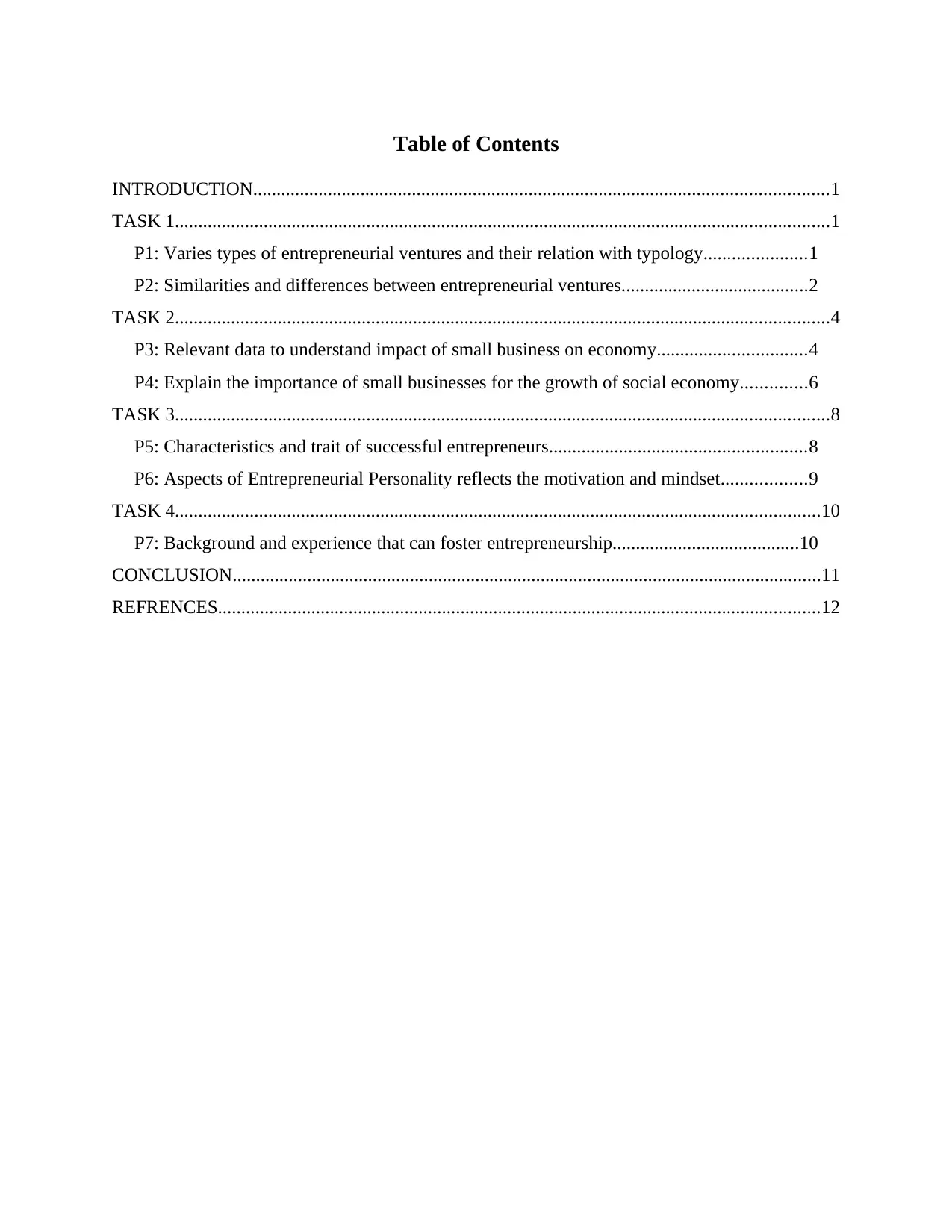
Table of Contents
INTRODUCTION...........................................................................................................................1
TASK 1............................................................................................................................................1
P1: Varies types of entrepreneurial ventures and their relation with typology......................1
P2: Similarities and differences between entrepreneurial ventures........................................2
TASK 2............................................................................................................................................4
P3: Relevant data to understand impact of small business on economy................................4
P4: Explain the importance of small businesses for the growth of social economy..............6
TASK 3............................................................................................................................................8
P5: Characteristics and trait of successful entrepreneurs.......................................................8
P6: Aspects of Entrepreneurial Personality reflects the motivation and mindset..................9
TASK 4..........................................................................................................................................10
P7: Background and experience that can foster entrepreneurship........................................10
CONCLUSION..............................................................................................................................11
REFRENCES.................................................................................................................................12
INTRODUCTION...........................................................................................................................1
TASK 1............................................................................................................................................1
P1: Varies types of entrepreneurial ventures and their relation with typology......................1
P2: Similarities and differences between entrepreneurial ventures........................................2
TASK 2............................................................................................................................................4
P3: Relevant data to understand impact of small business on economy................................4
P4: Explain the importance of small businesses for the growth of social economy..............6
TASK 3............................................................................................................................................8
P5: Characteristics and trait of successful entrepreneurs.......................................................8
P6: Aspects of Entrepreneurial Personality reflects the motivation and mindset..................9
TASK 4..........................................................................................................................................10
P7: Background and experience that can foster entrepreneurship........................................10
CONCLUSION..............................................................................................................................11
REFRENCES.................................................................................................................................12
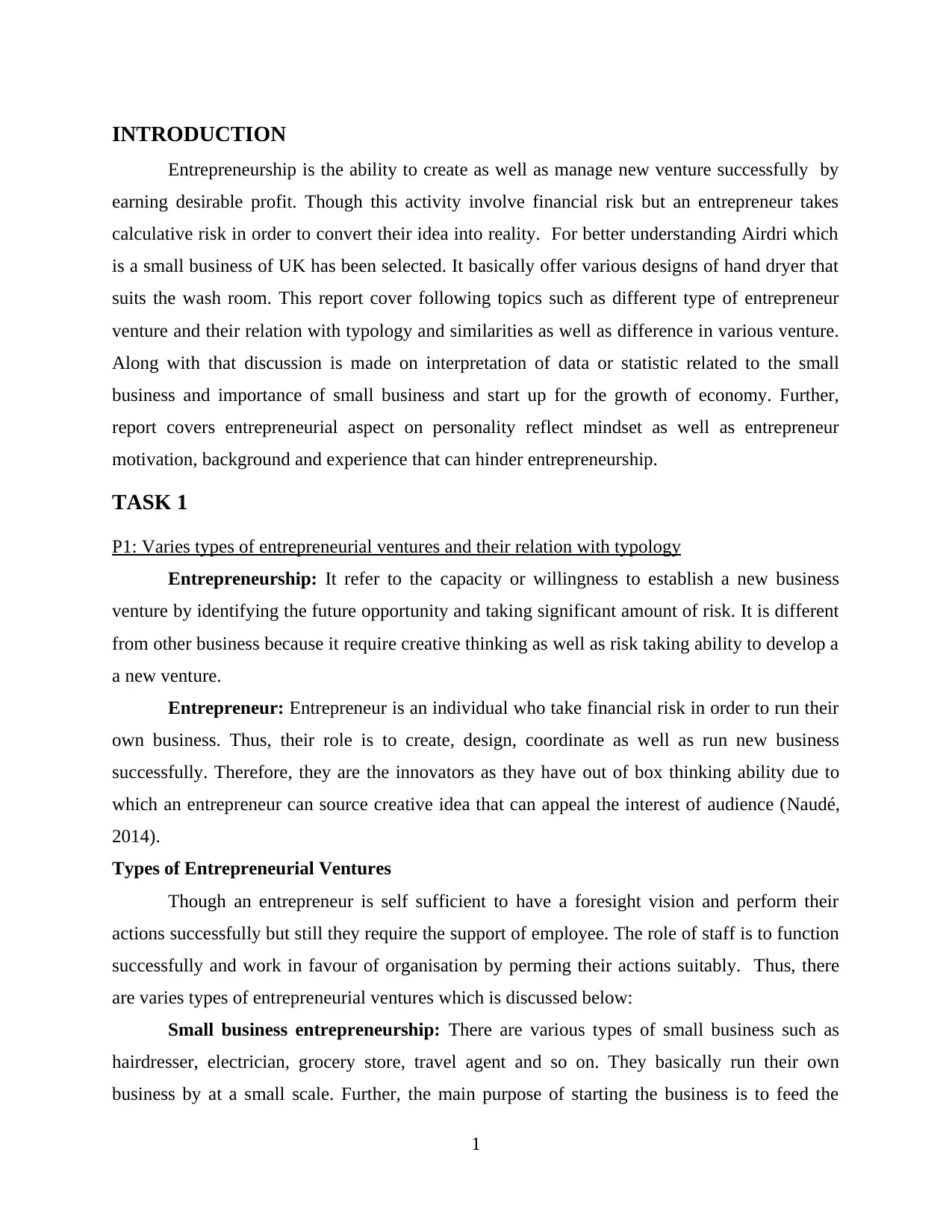
INTRODUCTION
Entrepreneurship is the ability to create as well as manage new venture successfully by
earning desirable profit. Though this activity involve financial risk but an entrepreneur takes
calculative risk in order to convert their idea into reality. For better understanding Airdri which
is a small business of UK has been selected. It basically offer various designs of hand dryer that
suits the wash room. This report cover following topics such as different type of entrepreneur
venture and their relation with typology and similarities as well as difference in various venture.
Along with that discussion is made on interpretation of data or statistic related to the small
business and importance of small business and start up for the growth of economy. Further,
report covers entrepreneurial aspect on personality reflect mindset as well as entrepreneur
motivation, background and experience that can hinder entrepreneurship.
TASK 1
P1: Varies types of entrepreneurial ventures and their relation with typology
Entrepreneurship: It refer to the capacity or willingness to establish a new business
venture by identifying the future opportunity and taking significant amount of risk. It is different
from other business because it require creative thinking as well as risk taking ability to develop a
a new venture.
Entrepreneur: Entrepreneur is an individual who take financial risk in order to run their
own business. Thus, their role is to create, design, coordinate as well as run new business
successfully. Therefore, they are the innovators as they have out of box thinking ability due to
which an entrepreneur can source creative idea that can appeal the interest of audience (Naudé,
2014).
Types of Entrepreneurial Ventures
Though an entrepreneur is self sufficient to have a foresight vision and perform their
actions successfully but still they require the support of employee. The role of staff is to function
successfully and work in favour of organisation by perming their actions suitably. Thus, there
are varies types of entrepreneurial ventures which is discussed below:
Small business entrepreneurship: There are various types of small business such as
hairdresser, electrician, grocery store, travel agent and so on. They basically run their own
business by at a small scale. Further, the main purpose of starting the business is to feed the
1
Entrepreneurship is the ability to create as well as manage new venture successfully by
earning desirable profit. Though this activity involve financial risk but an entrepreneur takes
calculative risk in order to convert their idea into reality. For better understanding Airdri which
is a small business of UK has been selected. It basically offer various designs of hand dryer that
suits the wash room. This report cover following topics such as different type of entrepreneur
venture and their relation with typology and similarities as well as difference in various venture.
Along with that discussion is made on interpretation of data or statistic related to the small
business and importance of small business and start up for the growth of economy. Further,
report covers entrepreneurial aspect on personality reflect mindset as well as entrepreneur
motivation, background and experience that can hinder entrepreneurship.
TASK 1
P1: Varies types of entrepreneurial ventures and their relation with typology
Entrepreneurship: It refer to the capacity or willingness to establish a new business
venture by identifying the future opportunity and taking significant amount of risk. It is different
from other business because it require creative thinking as well as risk taking ability to develop a
a new venture.
Entrepreneur: Entrepreneur is an individual who take financial risk in order to run their
own business. Thus, their role is to create, design, coordinate as well as run new business
successfully. Therefore, they are the innovators as they have out of box thinking ability due to
which an entrepreneur can source creative idea that can appeal the interest of audience (Naudé,
2014).
Types of Entrepreneurial Ventures
Though an entrepreneur is self sufficient to have a foresight vision and perform their
actions successfully but still they require the support of employee. The role of staff is to function
successfully and work in favour of organisation by perming their actions suitably. Thus, there
are varies types of entrepreneurial ventures which is discussed below:
Small business entrepreneurship: There are various types of small business such as
hairdresser, electrician, grocery store, travel agent and so on. They basically run their own
business by at a small scale. Further, the main purpose of starting the business is to feed the
1
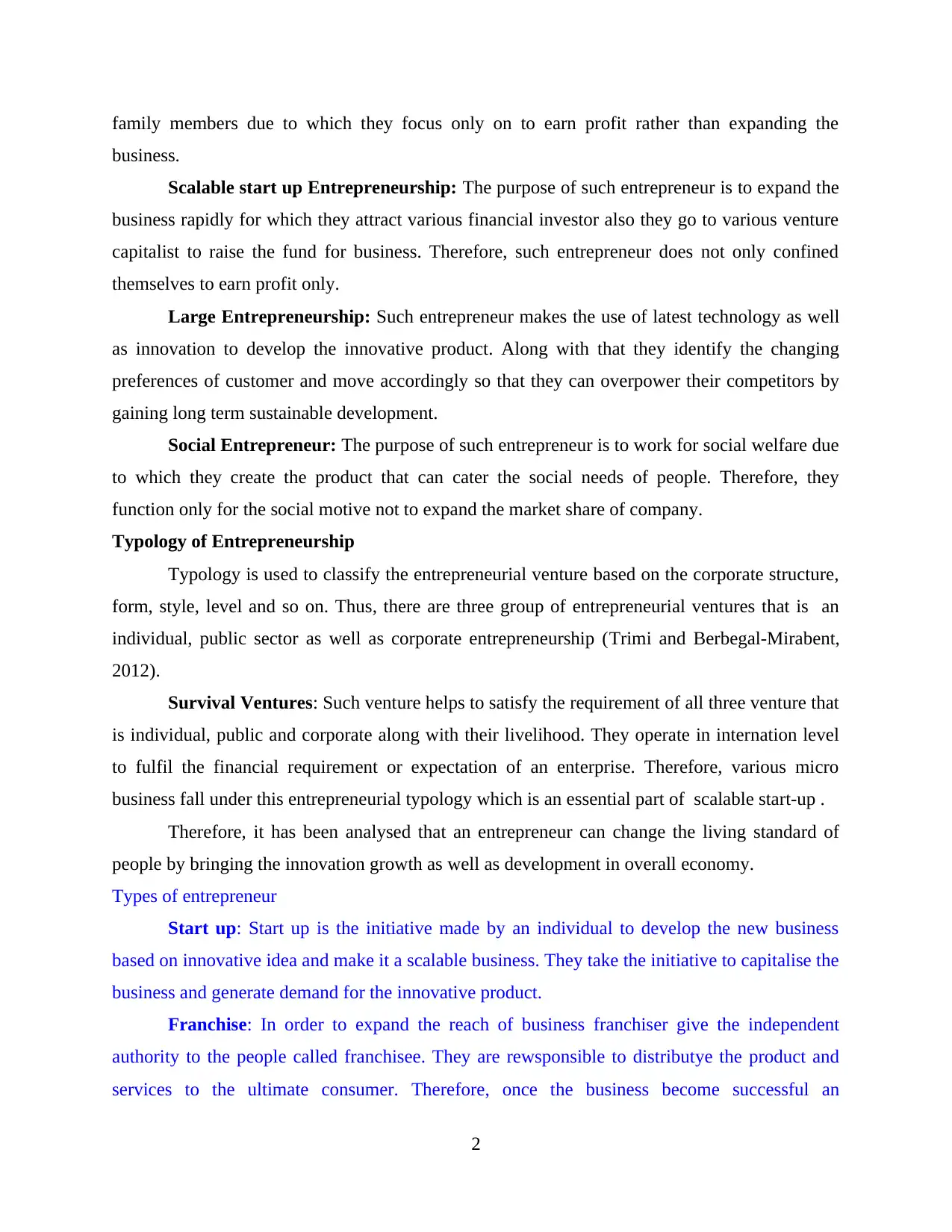
family members due to which they focus only on to earn profit rather than expanding the
business.
Scalable start up Entrepreneurship: The purpose of such entrepreneur is to expand the
business rapidly for which they attract various financial investor also they go to various venture
capitalist to raise the fund for business. Therefore, such entrepreneur does not only confined
themselves to earn profit only.
Large Entrepreneurship: Such entrepreneur makes the use of latest technology as well
as innovation to develop the innovative product. Along with that they identify the changing
preferences of customer and move accordingly so that they can overpower their competitors by
gaining long term sustainable development.
Social Entrepreneur: The purpose of such entrepreneur is to work for social welfare due
to which they create the product that can cater the social needs of people. Therefore, they
function only for the social motive not to expand the market share of company.
Typology of Entrepreneurship
Typology is used to classify the entrepreneurial venture based on the corporate structure,
form, style, level and so on. Thus, there are three group of entrepreneurial ventures that is an
individual, public sector as well as corporate entrepreneurship (Trimi and Berbegal-Mirabent,
2012).
Survival Ventures: Such venture helps to satisfy the requirement of all three venture that
is individual, public and corporate along with their livelihood. They operate in internation level
to fulfil the financial requirement or expectation of an enterprise. Therefore, various micro
business fall under this entrepreneurial typology which is an essential part of scalable start-up .
Therefore, it has been analysed that an entrepreneur can change the living standard of
people by bringing the innovation growth as well as development in overall economy.
Types of entrepreneur
Start up: Start up is the initiative made by an individual to develop the new business
based on innovative idea and make it a scalable business. They take the initiative to capitalise the
business and generate demand for the innovative product.
Franchise: In order to expand the reach of business franchiser give the independent
authority to the people called franchisee. They are rewsponsible to distributye the product and
services to the ultimate consumer. Therefore, once the business become successful an
2
business.
Scalable start up Entrepreneurship: The purpose of such entrepreneur is to expand the
business rapidly for which they attract various financial investor also they go to various venture
capitalist to raise the fund for business. Therefore, such entrepreneur does not only confined
themselves to earn profit only.
Large Entrepreneurship: Such entrepreneur makes the use of latest technology as well
as innovation to develop the innovative product. Along with that they identify the changing
preferences of customer and move accordingly so that they can overpower their competitors by
gaining long term sustainable development.
Social Entrepreneur: The purpose of such entrepreneur is to work for social welfare due
to which they create the product that can cater the social needs of people. Therefore, they
function only for the social motive not to expand the market share of company.
Typology of Entrepreneurship
Typology is used to classify the entrepreneurial venture based on the corporate structure,
form, style, level and so on. Thus, there are three group of entrepreneurial ventures that is an
individual, public sector as well as corporate entrepreneurship (Trimi and Berbegal-Mirabent,
2012).
Survival Ventures: Such venture helps to satisfy the requirement of all three venture that
is individual, public and corporate along with their livelihood. They operate in internation level
to fulfil the financial requirement or expectation of an enterprise. Therefore, various micro
business fall under this entrepreneurial typology which is an essential part of scalable start-up .
Therefore, it has been analysed that an entrepreneur can change the living standard of
people by bringing the innovation growth as well as development in overall economy.
Types of entrepreneur
Start up: Start up is the initiative made by an individual to develop the new business
based on innovative idea and make it a scalable business. They take the initiative to capitalise the
business and generate demand for the innovative product.
Franchise: In order to expand the reach of business franchiser give the independent
authority to the people called franchisee. They are rewsponsible to distributye the product and
services to the ultimate consumer. Therefore, once the business become successful an
2
Secure Best Marks with AI Grader
Need help grading? Try our AI Grader for instant feedback on your assignments.
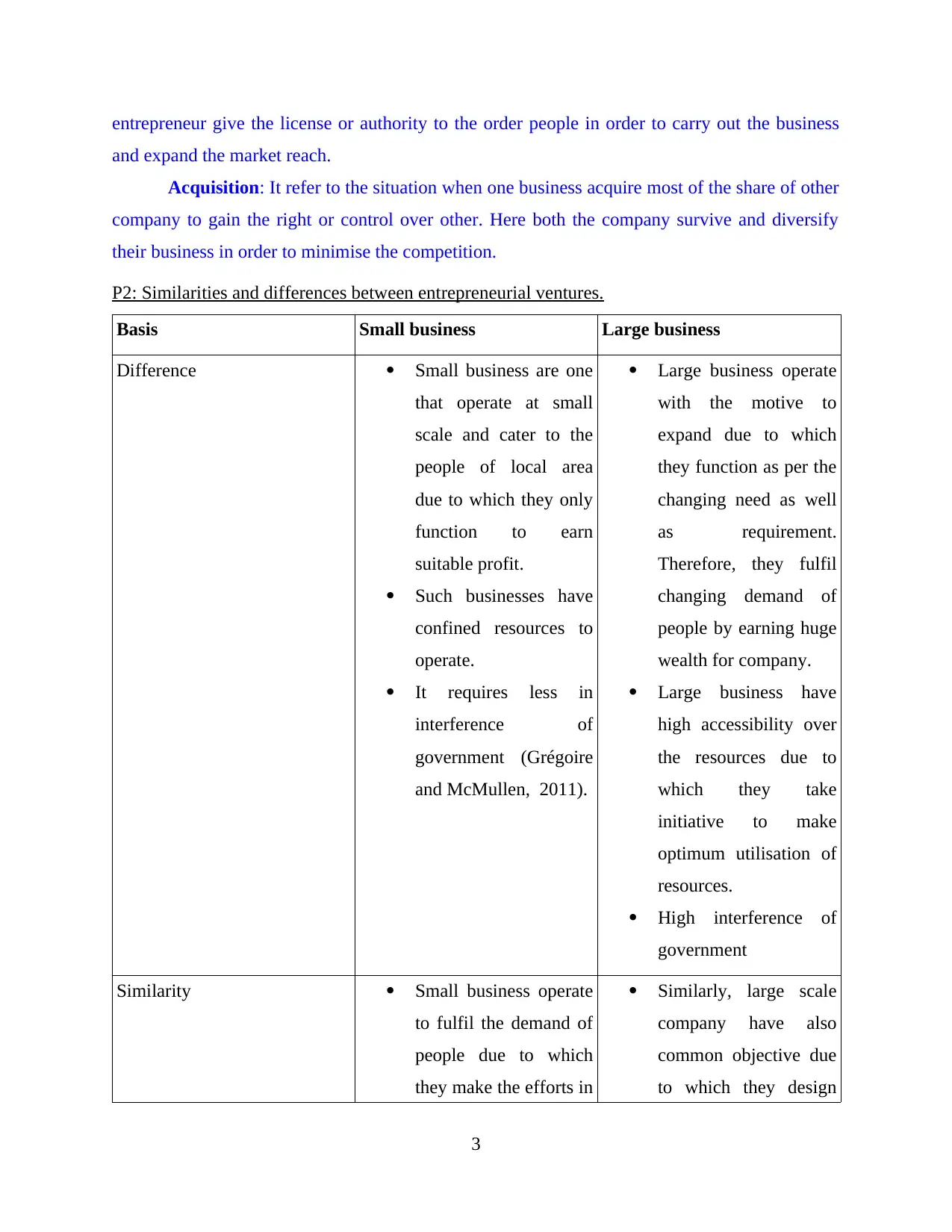
entrepreneur give the license or authority to the order people in order to carry out the business
and expand the market reach.
Acquisition: It refer to the situation when one business acquire most of the share of other
company to gain the right or control over other. Here both the company survive and diversify
their business in order to minimise the competition.
P2: Similarities and differences between entrepreneurial ventures.
Basis Small business Large business
Difference Small business are one
that operate at small
scale and cater to the
people of local area
due to which they only
function to earn
suitable profit.
Such businesses have
confined resources to
operate.
It requires less in
interference of
government (Grégoire
and McMullen, 2011).
Large business operate
with the motive to
expand due to which
they function as per the
changing need as well
as requirement.
Therefore, they fulfil
changing demand of
people by earning huge
wealth for company.
Large business have
high accessibility over
the resources due to
which they take
initiative to make
optimum utilisation of
resources.
High interference of
government
Similarity Small business operate
to fulfil the demand of
people due to which
they make the efforts in
Similarly, large scale
company have also
common objective due
to which they design
3
and expand the market reach.
Acquisition: It refer to the situation when one business acquire most of the share of other
company to gain the right or control over other. Here both the company survive and diversify
their business in order to minimise the competition.
P2: Similarities and differences between entrepreneurial ventures.
Basis Small business Large business
Difference Small business are one
that operate at small
scale and cater to the
people of local area
due to which they only
function to earn
suitable profit.
Such businesses have
confined resources to
operate.
It requires less in
interference of
government (Grégoire
and McMullen, 2011).
Large business operate
with the motive to
expand due to which
they function as per the
changing need as well
as requirement.
Therefore, they fulfil
changing demand of
people by earning huge
wealth for company.
Large business have
high accessibility over
the resources due to
which they take
initiative to make
optimum utilisation of
resources.
High interference of
government
Similarity Small business operate
to fulfil the demand of
people due to which
they make the efforts in
Similarly, large scale
company have also
common objective due
to which they design
3
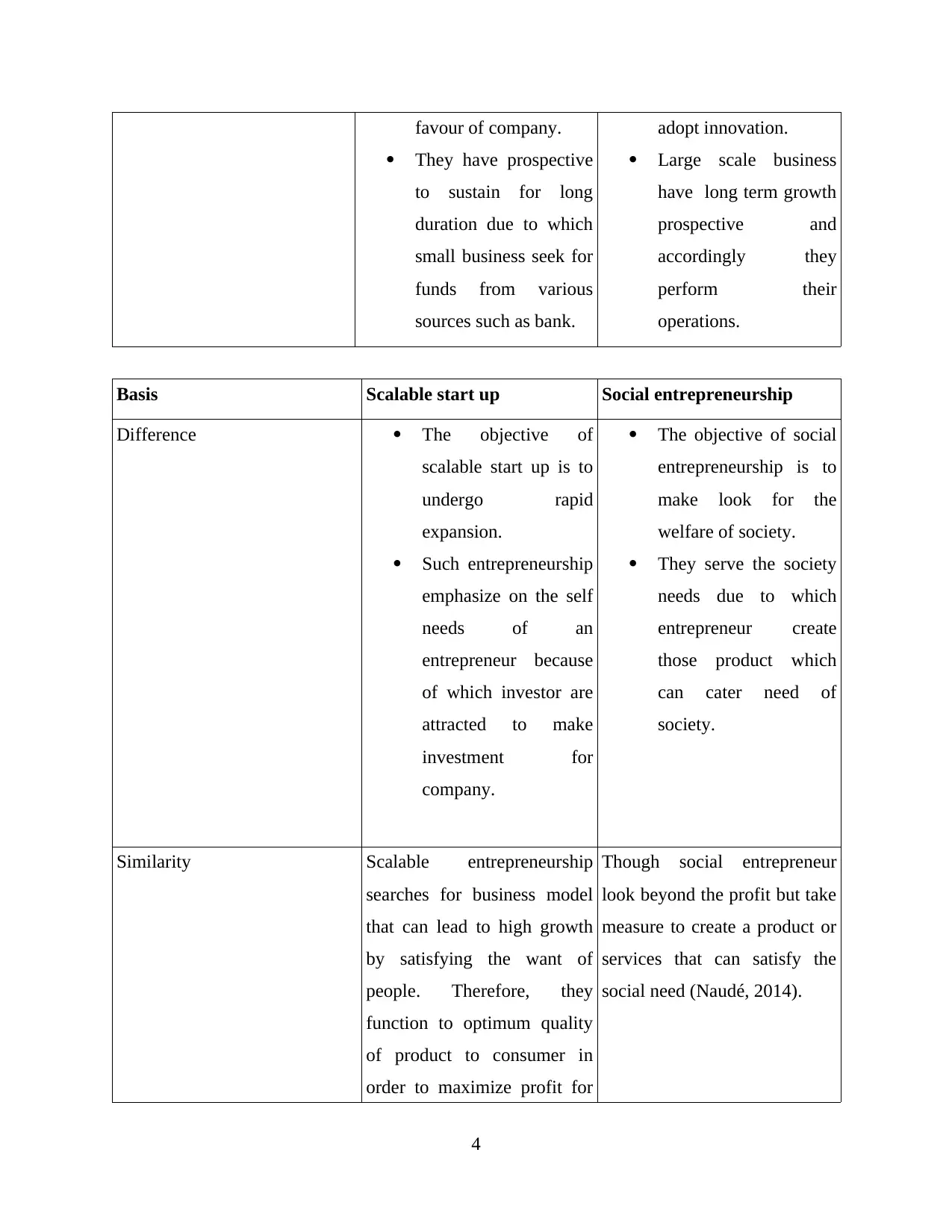
favour of company.
They have prospective
to sustain for long
duration due to which
small business seek for
funds from various
sources such as bank.
adopt innovation.
Large scale business
have long term growth
prospective and
accordingly they
perform their
operations.
Basis Scalable start up Social entrepreneurship
Difference The objective of
scalable start up is to
undergo rapid
expansion.
Such entrepreneurship
emphasize on the self
needs of an
entrepreneur because
of which investor are
attracted to make
investment for
company.
The objective of social
entrepreneurship is to
make look for the
welfare of society.
They serve the society
needs due to which
entrepreneur create
those product which
can cater need of
society.
Similarity Scalable entrepreneurship
searches for business model
that can lead to high growth
by satisfying the want of
people. Therefore, they
function to optimum quality
of product to consumer in
order to maximize profit for
Though social entrepreneur
look beyond the profit but take
measure to create a product or
services that can satisfy the
social need (Naudé, 2014).
4
They have prospective
to sustain for long
duration due to which
small business seek for
funds from various
sources such as bank.
adopt innovation.
Large scale business
have long term growth
prospective and
accordingly they
perform their
operations.
Basis Scalable start up Social entrepreneurship
Difference The objective of
scalable start up is to
undergo rapid
expansion.
Such entrepreneurship
emphasize on the self
needs of an
entrepreneur because
of which investor are
attracted to make
investment for
company.
The objective of social
entrepreneurship is to
make look for the
welfare of society.
They serve the society
needs due to which
entrepreneur create
those product which
can cater need of
society.
Similarity Scalable entrepreneurship
searches for business model
that can lead to high growth
by satisfying the want of
people. Therefore, they
function to optimum quality
of product to consumer in
order to maximize profit for
Though social entrepreneur
look beyond the profit but take
measure to create a product or
services that can satisfy the
social need (Naudé, 2014).
4
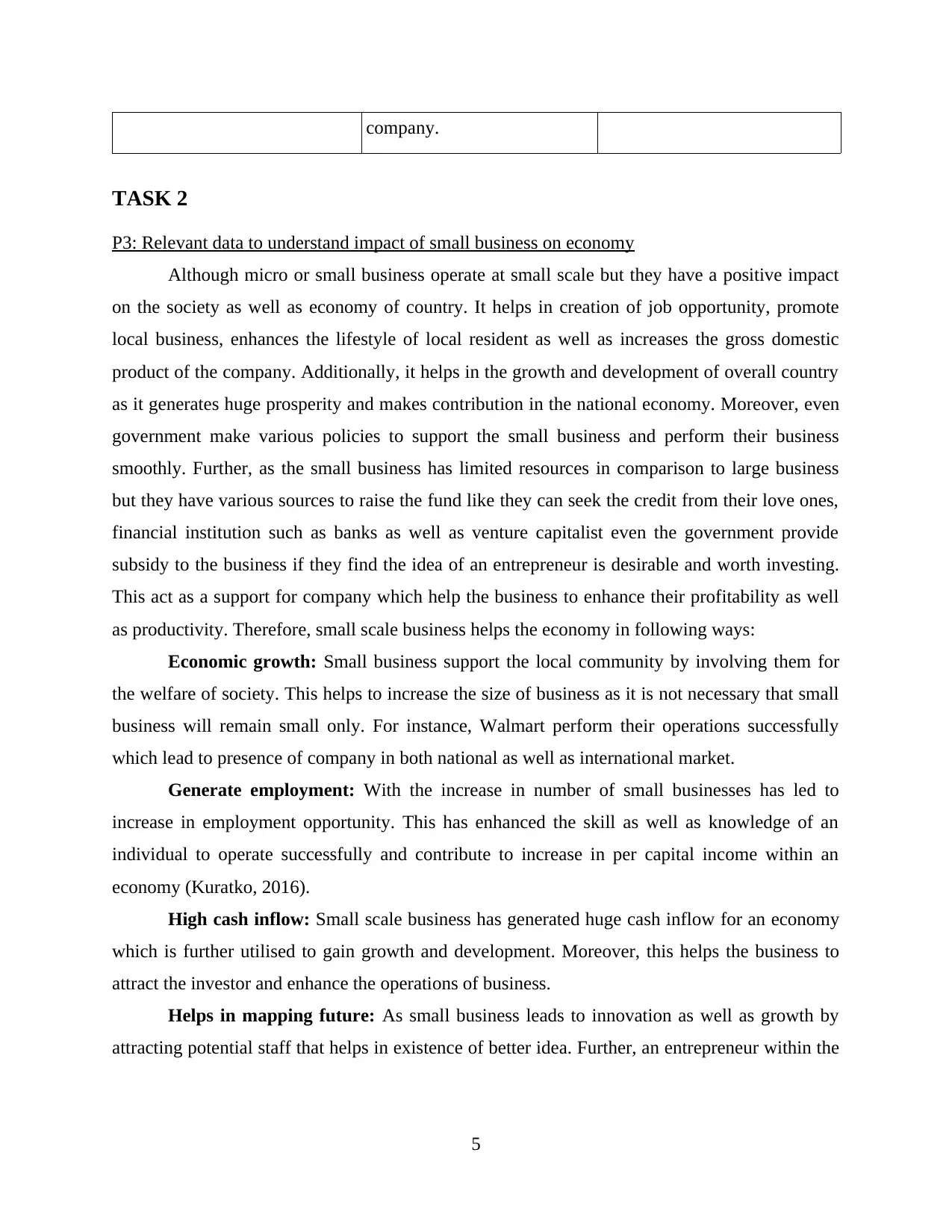
company.
TASK 2
P3: Relevant data to understand impact of small business on economy
Although micro or small business operate at small scale but they have a positive impact
on the society as well as economy of country. It helps in creation of job opportunity, promote
local business, enhances the lifestyle of local resident as well as increases the gross domestic
product of the company. Additionally, it helps in the growth and development of overall country
as it generates huge prosperity and makes contribution in the national economy. Moreover, even
government make various policies to support the small business and perform their business
smoothly. Further, as the small business has limited resources in comparison to large business
but they have various sources to raise the fund like they can seek the credit from their love ones,
financial institution such as banks as well as venture capitalist even the government provide
subsidy to the business if they find the idea of an entrepreneur is desirable and worth investing.
This act as a support for company which help the business to enhance their profitability as well
as productivity. Therefore, small scale business helps the economy in following ways:
Economic growth: Small business support the local community by involving them for
the welfare of society. This helps to increase the size of business as it is not necessary that small
business will remain small only. For instance, Walmart perform their operations successfully
which lead to presence of company in both national as well as international market.
Generate employment: With the increase in number of small businesses has led to
increase in employment opportunity. This has enhanced the skill as well as knowledge of an
individual to operate successfully and contribute to increase in per capital income within an
economy (Kuratko, 2016).
High cash inflow: Small scale business has generated huge cash inflow for an economy
which is further utilised to gain growth and development. Moreover, this helps the business to
attract the investor and enhance the operations of business.
Helps in mapping future: As small business leads to innovation as well as growth by
attracting potential staff that helps in existence of better idea. Further, an entrepreneur within the
5
TASK 2
P3: Relevant data to understand impact of small business on economy
Although micro or small business operate at small scale but they have a positive impact
on the society as well as economy of country. It helps in creation of job opportunity, promote
local business, enhances the lifestyle of local resident as well as increases the gross domestic
product of the company. Additionally, it helps in the growth and development of overall country
as it generates huge prosperity and makes contribution in the national economy. Moreover, even
government make various policies to support the small business and perform their business
smoothly. Further, as the small business has limited resources in comparison to large business
but they have various sources to raise the fund like they can seek the credit from their love ones,
financial institution such as banks as well as venture capitalist even the government provide
subsidy to the business if they find the idea of an entrepreneur is desirable and worth investing.
This act as a support for company which help the business to enhance their profitability as well
as productivity. Therefore, small scale business helps the economy in following ways:
Economic growth: Small business support the local community by involving them for
the welfare of society. This helps to increase the size of business as it is not necessary that small
business will remain small only. For instance, Walmart perform their operations successfully
which lead to presence of company in both national as well as international market.
Generate employment: With the increase in number of small businesses has led to
increase in employment opportunity. This has enhanced the skill as well as knowledge of an
individual to operate successfully and contribute to increase in per capital income within an
economy (Kuratko, 2016).
High cash inflow: Small scale business has generated huge cash inflow for an economy
which is further utilised to gain growth and development. Moreover, this helps the business to
attract the investor and enhance the operations of business.
Helps in mapping future: As small business leads to innovation as well as growth by
attracting potential staff that helps in existence of better idea. Further, an entrepreneur within the
5
Paraphrase This Document
Need a fresh take? Get an instant paraphrase of this document with our AI Paraphraser
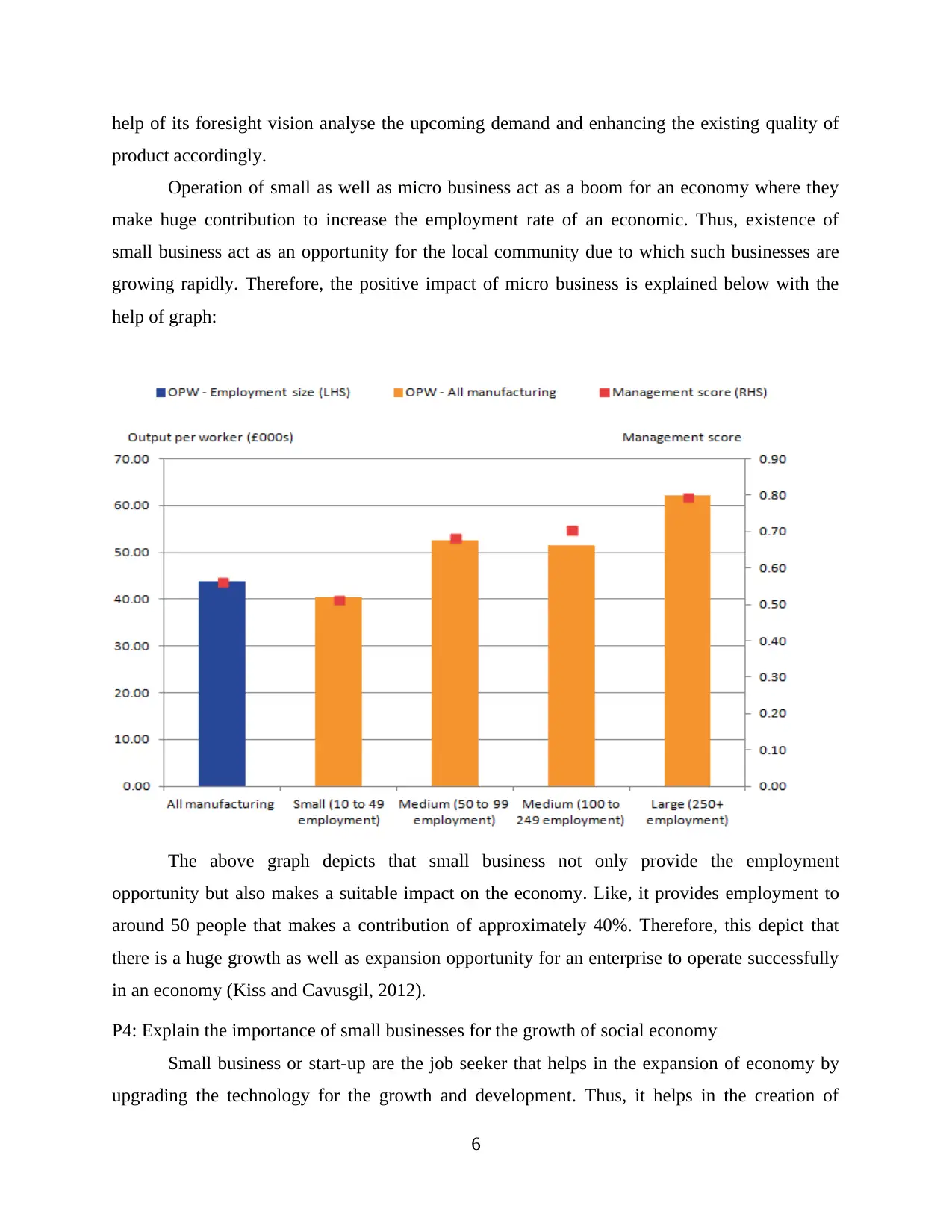
help of its foresight vision analyse the upcoming demand and enhancing the existing quality of
product accordingly.
Operation of small as well as micro business act as a boom for an economy where they
make huge contribution to increase the employment rate of an economic. Thus, existence of
small business act as an opportunity for the local community due to which such businesses are
growing rapidly. Therefore, the positive impact of micro business is explained below with the
help of graph:
The above graph depicts that small business not only provide the employment
opportunity but also makes a suitable impact on the economy. Like, it provides employment to
around 50 people that makes a contribution of approximately 40%. Therefore, this depict that
there is a huge growth as well as expansion opportunity for an enterprise to operate successfully
in an economy (Kiss and Cavusgil, 2012).
P4: Explain the importance of small businesses for the growth of social economy
Small business or start-up are the job seeker that helps in the expansion of economy by
upgrading the technology for the growth and development. Thus, it helps in the creation of
6
product accordingly.
Operation of small as well as micro business act as a boom for an economy where they
make huge contribution to increase the employment rate of an economic. Thus, existence of
small business act as an opportunity for the local community due to which such businesses are
growing rapidly. Therefore, the positive impact of micro business is explained below with the
help of graph:
The above graph depicts that small business not only provide the employment
opportunity but also makes a suitable impact on the economy. Like, it provides employment to
around 50 people that makes a contribution of approximately 40%. Therefore, this depict that
there is a huge growth as well as expansion opportunity for an enterprise to operate successfully
in an economy (Kiss and Cavusgil, 2012).
P4: Explain the importance of small businesses for the growth of social economy
Small business or start-up are the job seeker that helps in the expansion of economy by
upgrading the technology for the growth and development. Thus, it helps in the creation of
6
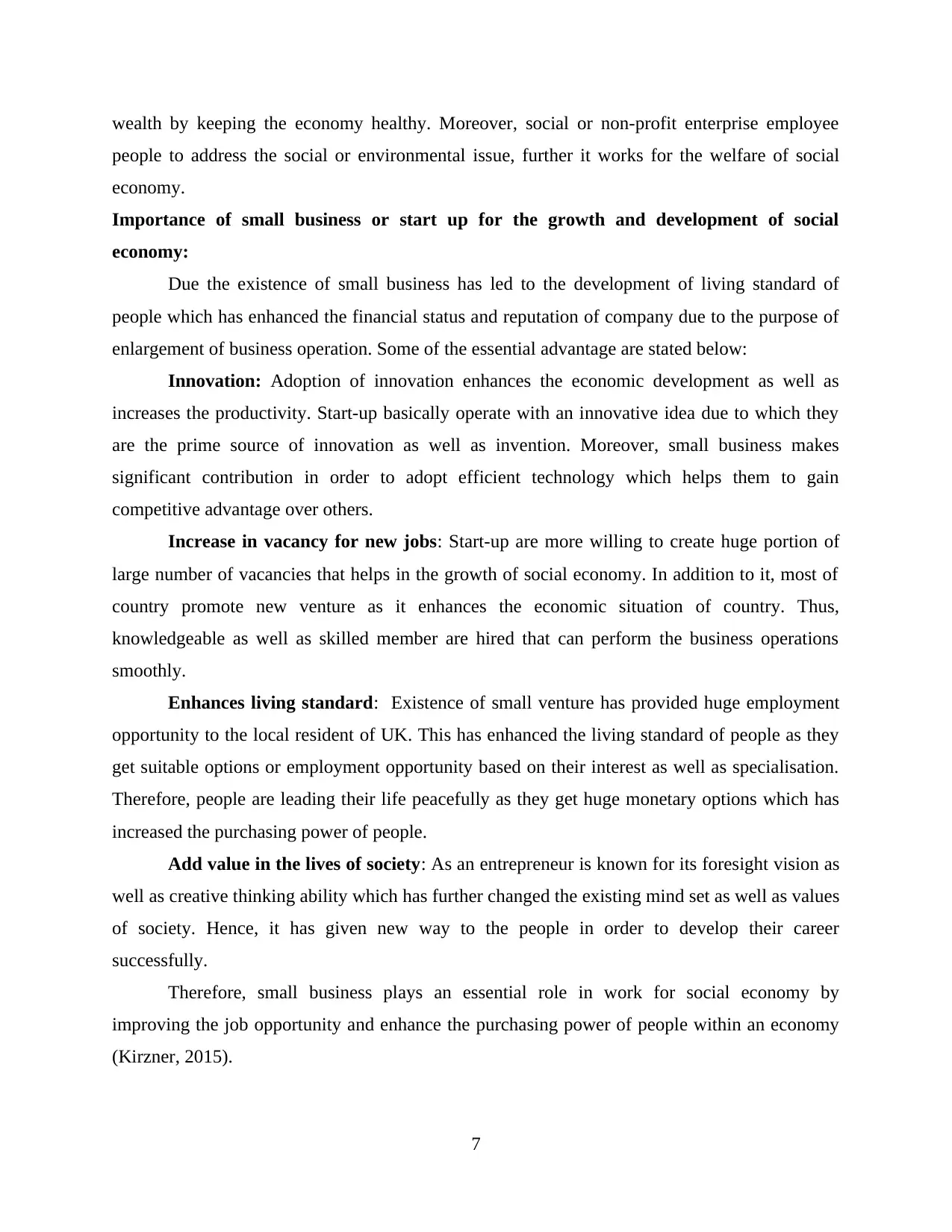
wealth by keeping the economy healthy. Moreover, social or non-profit enterprise employee
people to address the social or environmental issue, further it works for the welfare of social
economy.
Importance of small business or start up for the growth and development of social
economy:
Due the existence of small business has led to the development of living standard of
people which has enhanced the financial status and reputation of company due to the purpose of
enlargement of business operation. Some of the essential advantage are stated below:
Innovation: Adoption of innovation enhances the economic development as well as
increases the productivity. Start-up basically operate with an innovative idea due to which they
are the prime source of innovation as well as invention. Moreover, small business makes
significant contribution in order to adopt efficient technology which helps them to gain
competitive advantage over others.
Increase in vacancy for new jobs: Start-up are more willing to create huge portion of
large number of vacancies that helps in the growth of social economy. In addition to it, most of
country promote new venture as it enhances the economic situation of country. Thus,
knowledgeable as well as skilled member are hired that can perform the business operations
smoothly.
Enhances living standard: Existence of small venture has provided huge employment
opportunity to the local resident of UK. This has enhanced the living standard of people as they
get suitable options or employment opportunity based on their interest as well as specialisation.
Therefore, people are leading their life peacefully as they get huge monetary options which has
increased the purchasing power of people.
Add value in the lives of society: As an entrepreneur is known for its foresight vision as
well as creative thinking ability which has further changed the existing mind set as well as values
of society. Hence, it has given new way to the people in order to develop their career
successfully.
Therefore, small business plays an essential role in work for social economy by
improving the job opportunity and enhance the purchasing power of people within an economy
(Kirzner, 2015).
7
people to address the social or environmental issue, further it works for the welfare of social
economy.
Importance of small business or start up for the growth and development of social
economy:
Due the existence of small business has led to the development of living standard of
people which has enhanced the financial status and reputation of company due to the purpose of
enlargement of business operation. Some of the essential advantage are stated below:
Innovation: Adoption of innovation enhances the economic development as well as
increases the productivity. Start-up basically operate with an innovative idea due to which they
are the prime source of innovation as well as invention. Moreover, small business makes
significant contribution in order to adopt efficient technology which helps them to gain
competitive advantage over others.
Increase in vacancy for new jobs: Start-up are more willing to create huge portion of
large number of vacancies that helps in the growth of social economy. In addition to it, most of
country promote new venture as it enhances the economic situation of country. Thus,
knowledgeable as well as skilled member are hired that can perform the business operations
smoothly.
Enhances living standard: Existence of small venture has provided huge employment
opportunity to the local resident of UK. This has enhanced the living standard of people as they
get suitable options or employment opportunity based on their interest as well as specialisation.
Therefore, people are leading their life peacefully as they get huge monetary options which has
increased the purchasing power of people.
Add value in the lives of society: As an entrepreneur is known for its foresight vision as
well as creative thinking ability which has further changed the existing mind set as well as values
of society. Hence, it has given new way to the people in order to develop their career
successfully.
Therefore, small business plays an essential role in work for social economy by
improving the job opportunity and enhance the purchasing power of people within an economy
(Kirzner, 2015).
7
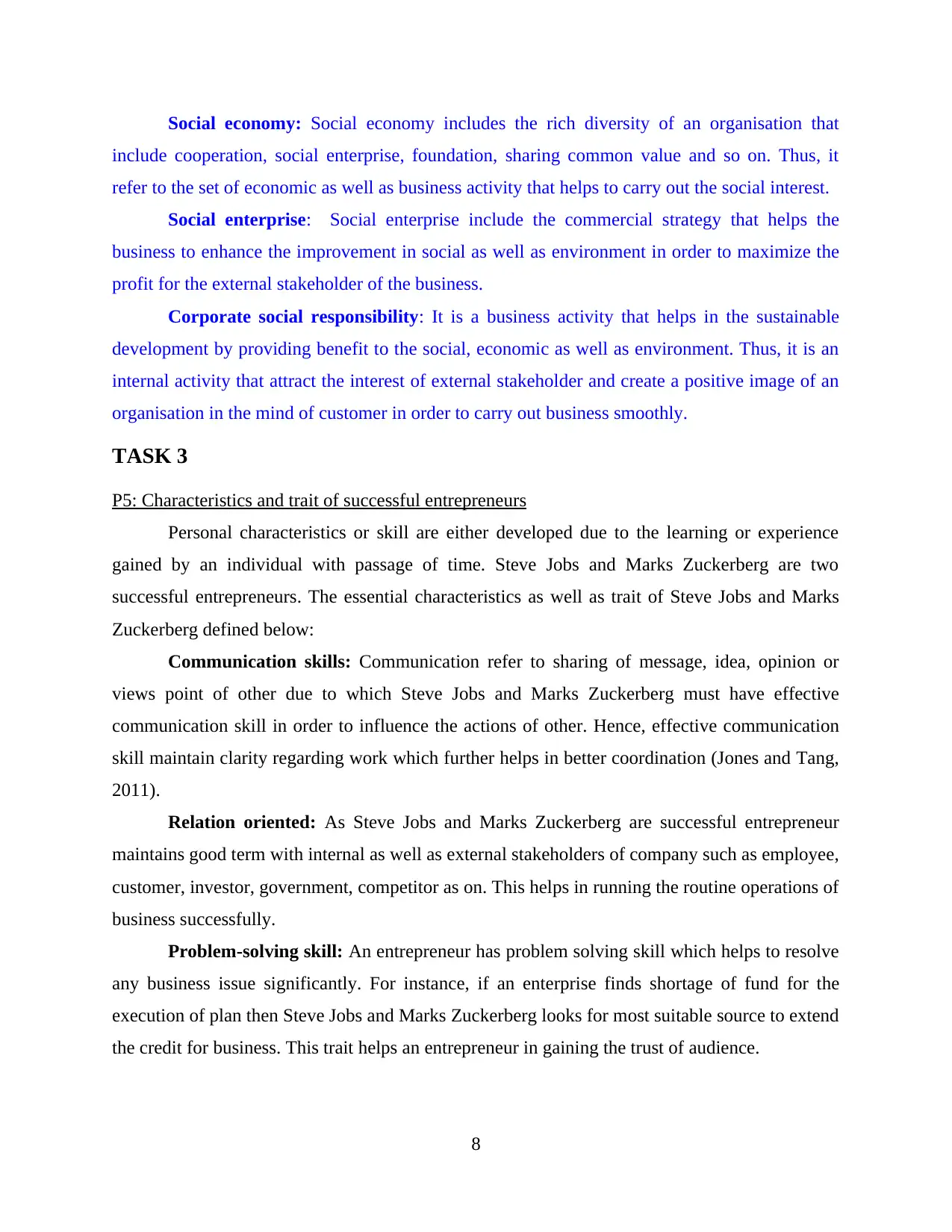
Social economy: Social economy includes the rich diversity of an organisation that
include cooperation, social enterprise, foundation, sharing common value and so on. Thus, it
refer to the set of economic as well as business activity that helps to carry out the social interest.
Social enterprise: Social enterprise include the commercial strategy that helps the
business to enhance the improvement in social as well as environment in order to maximize the
profit for the external stakeholder of the business.
Corporate social responsibility: It is a business activity that helps in the sustainable
development by providing benefit to the social, economic as well as environment. Thus, it is an
internal activity that attract the interest of external stakeholder and create a positive image of an
organisation in the mind of customer in order to carry out business smoothly.
TASK 3
P5: Characteristics and trait of successful entrepreneurs
Personal characteristics or skill are either developed due to the learning or experience
gained by an individual with passage of time. Steve Jobs and Marks Zuckerberg are two
successful entrepreneurs. The essential characteristics as well as trait of Steve Jobs and Marks
Zuckerberg defined below:
Communication skills: Communication refer to sharing of message, idea, opinion or
views point of other due to which Steve Jobs and Marks Zuckerberg must have effective
communication skill in order to influence the actions of other. Hence, effective communication
skill maintain clarity regarding work which further helps in better coordination (Jones and Tang,
2011).
Relation oriented: As Steve Jobs and Marks Zuckerberg are successful entrepreneur
maintains good term with internal as well as external stakeholders of company such as employee,
customer, investor, government, competitor as on. This helps in running the routine operations of
business successfully.
Problem-solving skill: An entrepreneur has problem solving skill which helps to resolve
any business issue significantly. For instance, if an enterprise finds shortage of fund for the
execution of plan then Steve Jobs and Marks Zuckerberg looks for most suitable source to extend
the credit for business. This trait helps an entrepreneur in gaining the trust of audience.
8
include cooperation, social enterprise, foundation, sharing common value and so on. Thus, it
refer to the set of economic as well as business activity that helps to carry out the social interest.
Social enterprise: Social enterprise include the commercial strategy that helps the
business to enhance the improvement in social as well as environment in order to maximize the
profit for the external stakeholder of the business.
Corporate social responsibility: It is a business activity that helps in the sustainable
development by providing benefit to the social, economic as well as environment. Thus, it is an
internal activity that attract the interest of external stakeholder and create a positive image of an
organisation in the mind of customer in order to carry out business smoothly.
TASK 3
P5: Characteristics and trait of successful entrepreneurs
Personal characteristics or skill are either developed due to the learning or experience
gained by an individual with passage of time. Steve Jobs and Marks Zuckerberg are two
successful entrepreneurs. The essential characteristics as well as trait of Steve Jobs and Marks
Zuckerberg defined below:
Communication skills: Communication refer to sharing of message, idea, opinion or
views point of other due to which Steve Jobs and Marks Zuckerberg must have effective
communication skill in order to influence the actions of other. Hence, effective communication
skill maintain clarity regarding work which further helps in better coordination (Jones and Tang,
2011).
Relation oriented: As Steve Jobs and Marks Zuckerberg are successful entrepreneur
maintains good term with internal as well as external stakeholders of company such as employee,
customer, investor, government, competitor as on. This helps in running the routine operations of
business successfully.
Problem-solving skill: An entrepreneur has problem solving skill which helps to resolve
any business issue significantly. For instance, if an enterprise finds shortage of fund for the
execution of plan then Steve Jobs and Marks Zuckerberg looks for most suitable source to extend
the credit for business. This trait helps an entrepreneur in gaining the trust of audience.
8
Secure Best Marks with AI Grader
Need help grading? Try our AI Grader for instant feedback on your assignments.
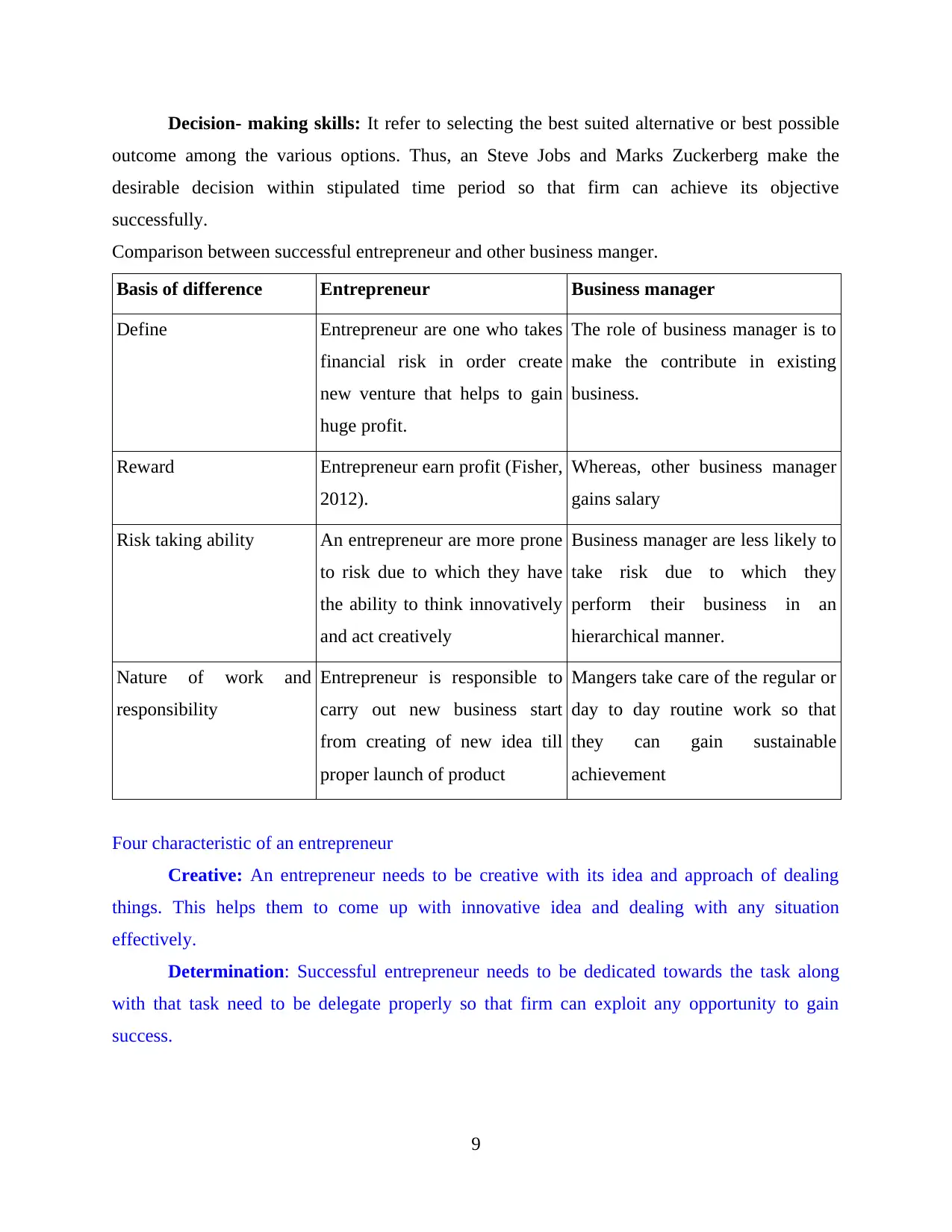
Decision- making skills: It refer to selecting the best suited alternative or best possible
outcome among the various options. Thus, an Steve Jobs and Marks Zuckerberg make the
desirable decision within stipulated time period so that firm can achieve its objective
successfully.
Comparison between successful entrepreneur and other business manger.
Basis of difference Entrepreneur Business manager
Define Entrepreneur are one who takes
financial risk in order create
new venture that helps to gain
huge profit.
The role of business manager is to
make the contribute in existing
business.
Reward Entrepreneur earn profit (Fisher,
2012).
Whereas, other business manager
gains salary
Risk taking ability An entrepreneur are more prone
to risk due to which they have
the ability to think innovatively
and act creatively
Business manager are less likely to
take risk due to which they
perform their business in an
hierarchical manner.
Nature of work and
responsibility
Entrepreneur is responsible to
carry out new business start
from creating of new idea till
proper launch of product
Mangers take care of the regular or
day to day routine work so that
they can gain sustainable
achievement
Four characteristic of an entrepreneur
Creative: An entrepreneur needs to be creative with its idea and approach of dealing
things. This helps them to come up with innovative idea and dealing with any situation
effectively.
Determination: Successful entrepreneur needs to be dedicated towards the task along
with that task need to be delegate properly so that firm can exploit any opportunity to gain
success.
9
outcome among the various options. Thus, an Steve Jobs and Marks Zuckerberg make the
desirable decision within stipulated time period so that firm can achieve its objective
successfully.
Comparison between successful entrepreneur and other business manger.
Basis of difference Entrepreneur Business manager
Define Entrepreneur are one who takes
financial risk in order create
new venture that helps to gain
huge profit.
The role of business manager is to
make the contribute in existing
business.
Reward Entrepreneur earn profit (Fisher,
2012).
Whereas, other business manager
gains salary
Risk taking ability An entrepreneur are more prone
to risk due to which they have
the ability to think innovatively
and act creatively
Business manager are less likely to
take risk due to which they
perform their business in an
hierarchical manner.
Nature of work and
responsibility
Entrepreneur is responsible to
carry out new business start
from creating of new idea till
proper launch of product
Mangers take care of the regular or
day to day routine work so that
they can gain sustainable
achievement
Four characteristic of an entrepreneur
Creative: An entrepreneur needs to be creative with its idea and approach of dealing
things. This helps them to come up with innovative idea and dealing with any situation
effectively.
Determination: Successful entrepreneur needs to be dedicated towards the task along
with that task need to be delegate properly so that firm can exploit any opportunity to gain
success.
9
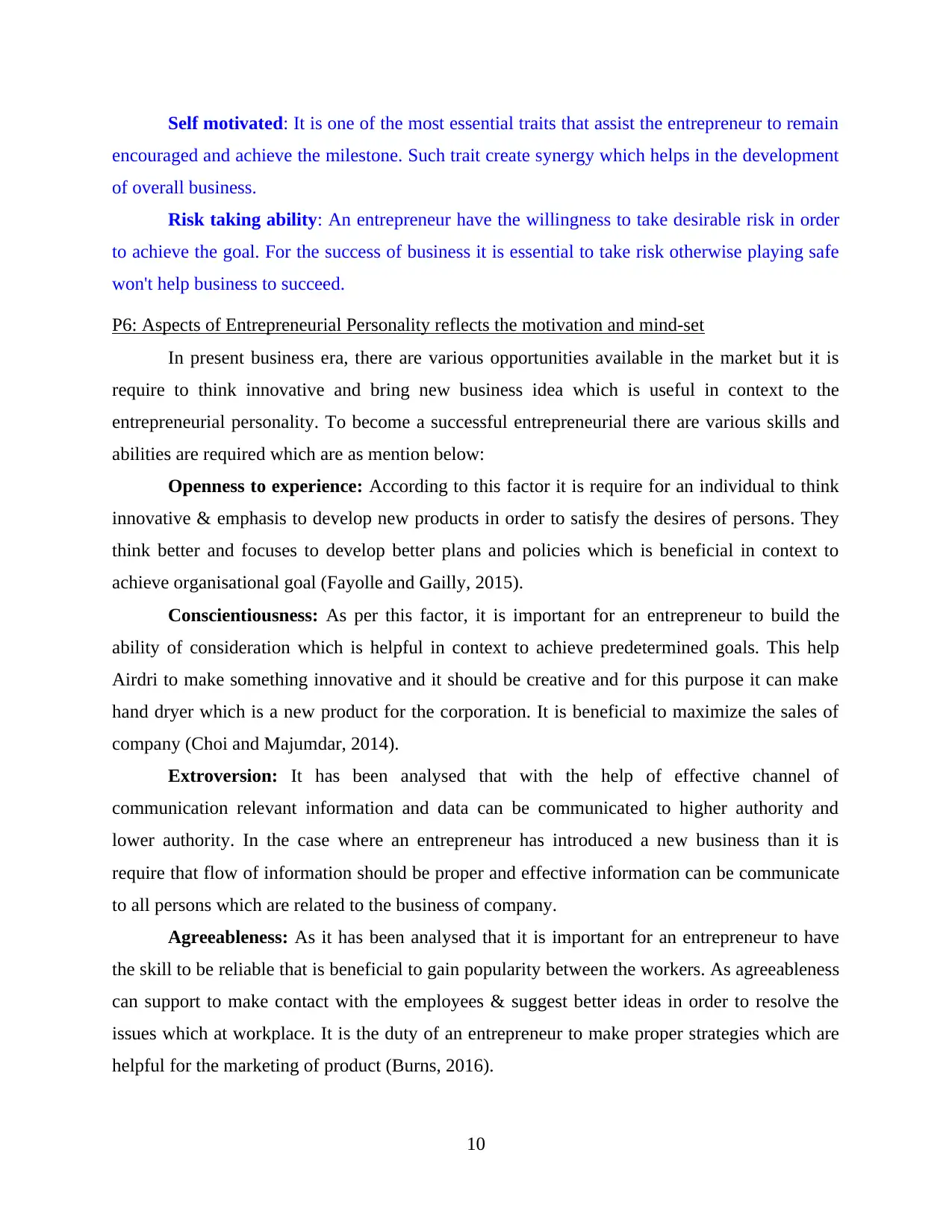
Self motivated: It is one of the most essential traits that assist the entrepreneur to remain
encouraged and achieve the milestone. Such trait create synergy which helps in the development
of overall business.
Risk taking ability: An entrepreneur have the willingness to take desirable risk in order
to achieve the goal. For the success of business it is essential to take risk otherwise playing safe
won't help business to succeed.
P6: Aspects of Entrepreneurial Personality reflects the motivation and mind-set
In present business era, there are various opportunities available in the market but it is
require to think innovative and bring new business idea which is useful in context to the
entrepreneurial personality. To become a successful entrepreneurial there are various skills and
abilities are required which are as mention below:
Openness to experience: According to this factor it is require for an individual to think
innovative & emphasis to develop new products in order to satisfy the desires of persons. They
think better and focuses to develop better plans and policies which is beneficial in context to
achieve organisational goal (Fayolle and Gailly, 2015).
Conscientiousness: As per this factor, it is important for an entrepreneur to build the
ability of consideration which is helpful in context to achieve predetermined goals. This help
Airdri to make something innovative and it should be creative and for this purpose it can make
hand dryer which is a new product for the corporation. It is beneficial to maximize the sales of
company (Choi and Majumdar, 2014).
Extroversion: It has been analysed that with the help of effective channel of
communication relevant information and data can be communicated to higher authority and
lower authority. In the case where an entrepreneur has introduced a new business than it is
require that flow of information should be proper and effective information can be communicate
to all persons which are related to the business of company.
Agreeableness: As it has been analysed that it is important for an entrepreneur to have
the skill to be reliable that is beneficial to gain popularity between the workers. As agreeableness
can support to make contact with the employees & suggest better ideas in order to resolve the
issues which at workplace. It is the duty of an entrepreneur to make proper strategies which are
helpful for the marketing of product (Burns, 2016).
10
encouraged and achieve the milestone. Such trait create synergy which helps in the development
of overall business.
Risk taking ability: An entrepreneur have the willingness to take desirable risk in order
to achieve the goal. For the success of business it is essential to take risk otherwise playing safe
won't help business to succeed.
P6: Aspects of Entrepreneurial Personality reflects the motivation and mind-set
In present business era, there are various opportunities available in the market but it is
require to think innovative and bring new business idea which is useful in context to the
entrepreneurial personality. To become a successful entrepreneurial there are various skills and
abilities are required which are as mention below:
Openness to experience: According to this factor it is require for an individual to think
innovative & emphasis to develop new products in order to satisfy the desires of persons. They
think better and focuses to develop better plans and policies which is beneficial in context to
achieve organisational goal (Fayolle and Gailly, 2015).
Conscientiousness: As per this factor, it is important for an entrepreneur to build the
ability of consideration which is helpful in context to achieve predetermined goals. This help
Airdri to make something innovative and it should be creative and for this purpose it can make
hand dryer which is a new product for the corporation. It is beneficial to maximize the sales of
company (Choi and Majumdar, 2014).
Extroversion: It has been analysed that with the help of effective channel of
communication relevant information and data can be communicated to higher authority and
lower authority. In the case where an entrepreneur has introduced a new business than it is
require that flow of information should be proper and effective information can be communicate
to all persons which are related to the business of company.
Agreeableness: As it has been analysed that it is important for an entrepreneur to have
the skill to be reliable that is beneficial to gain popularity between the workers. As agreeableness
can support to make contact with the employees & suggest better ideas in order to resolve the
issues which at workplace. It is the duty of an entrepreneur to make proper strategies which are
helpful for the marketing of product (Burns, 2016).
10
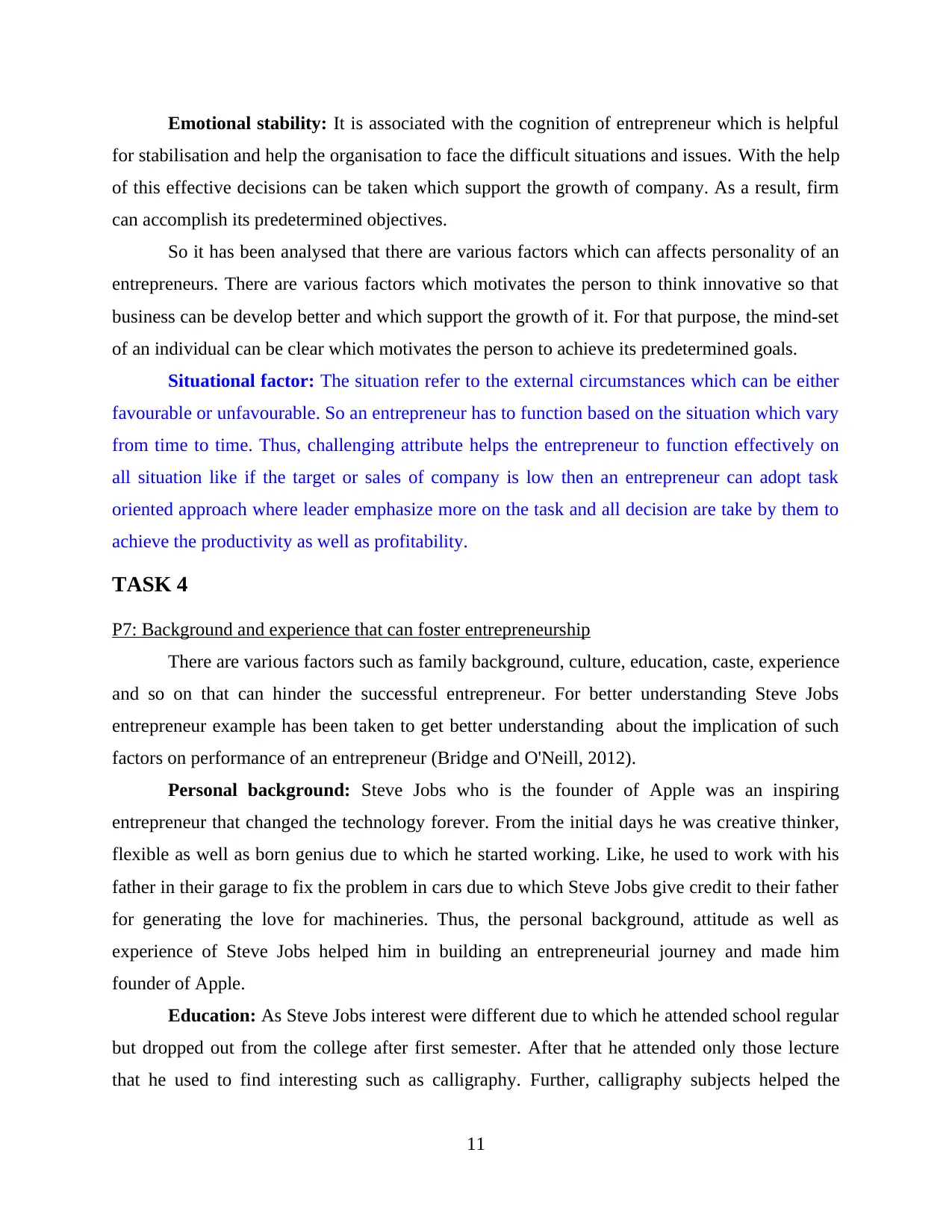
Emotional stability: It is associated with the cognition of entrepreneur which is helpful
for stabilisation and help the organisation to face the difficult situations and issues. With the help
of this effective decisions can be taken which support the growth of company. As a result, firm
can accomplish its predetermined objectives.
So it has been analysed that there are various factors which can affects personality of an
entrepreneurs. There are various factors which motivates the person to think innovative so that
business can be develop better and which support the growth of it. For that purpose, the mind-set
of an individual can be clear which motivates the person to achieve its predetermined goals.
Situational factor: The situation refer to the external circumstances which can be either
favourable or unfavourable. So an entrepreneur has to function based on the situation which vary
from time to time. Thus, challenging attribute helps the entrepreneur to function effectively on
all situation like if the target or sales of company is low then an entrepreneur can adopt task
oriented approach where leader emphasize more on the task and all decision are take by them to
achieve the productivity as well as profitability.
TASK 4
P7: Background and experience that can foster entrepreneurship
There are various factors such as family background, culture, education, caste, experience
and so on that can hinder the successful entrepreneur. For better understanding Steve Jobs
entrepreneur example has been taken to get better understanding about the implication of such
factors on performance of an entrepreneur (Bridge and O'Neill, 2012).
Personal background: Steve Jobs who is the founder of Apple was an inspiring
entrepreneur that changed the technology forever. From the initial days he was creative thinker,
flexible as well as born genius due to which he started working. Like, he used to work with his
father in their garage to fix the problem in cars due to which Steve Jobs give credit to their father
for generating the love for machineries. Thus, the personal background, attitude as well as
experience of Steve Jobs helped him in building an entrepreneurial journey and made him
founder of Apple.
Education: As Steve Jobs interest were different due to which he attended school regular
but dropped out from the college after first semester. After that he attended only those lecture
that he used to find interesting such as calligraphy. Further, calligraphy subjects helped the
11
for stabilisation and help the organisation to face the difficult situations and issues. With the help
of this effective decisions can be taken which support the growth of company. As a result, firm
can accomplish its predetermined objectives.
So it has been analysed that there are various factors which can affects personality of an
entrepreneurs. There are various factors which motivates the person to think innovative so that
business can be develop better and which support the growth of it. For that purpose, the mind-set
of an individual can be clear which motivates the person to achieve its predetermined goals.
Situational factor: The situation refer to the external circumstances which can be either
favourable or unfavourable. So an entrepreneur has to function based on the situation which vary
from time to time. Thus, challenging attribute helps the entrepreneur to function effectively on
all situation like if the target or sales of company is low then an entrepreneur can adopt task
oriented approach where leader emphasize more on the task and all decision are take by them to
achieve the productivity as well as profitability.
TASK 4
P7: Background and experience that can foster entrepreneurship
There are various factors such as family background, culture, education, caste, experience
and so on that can hinder the successful entrepreneur. For better understanding Steve Jobs
entrepreneur example has been taken to get better understanding about the implication of such
factors on performance of an entrepreneur (Bridge and O'Neill, 2012).
Personal background: Steve Jobs who is the founder of Apple was an inspiring
entrepreneur that changed the technology forever. From the initial days he was creative thinker,
flexible as well as born genius due to which he started working. Like, he used to work with his
father in their garage to fix the problem in cars due to which Steve Jobs give credit to their father
for generating the love for machineries. Thus, the personal background, attitude as well as
experience of Steve Jobs helped him in building an entrepreneurial journey and made him
founder of Apple.
Education: As Steve Jobs interest were different due to which he attended school regular
but dropped out from the college after first semester. After that he attended only those lecture
that he used to find interesting such as calligraphy. Further, calligraphy subjects helped the
11
Paraphrase This Document
Need a fresh take? Get an instant paraphrase of this document with our AI Paraphraser
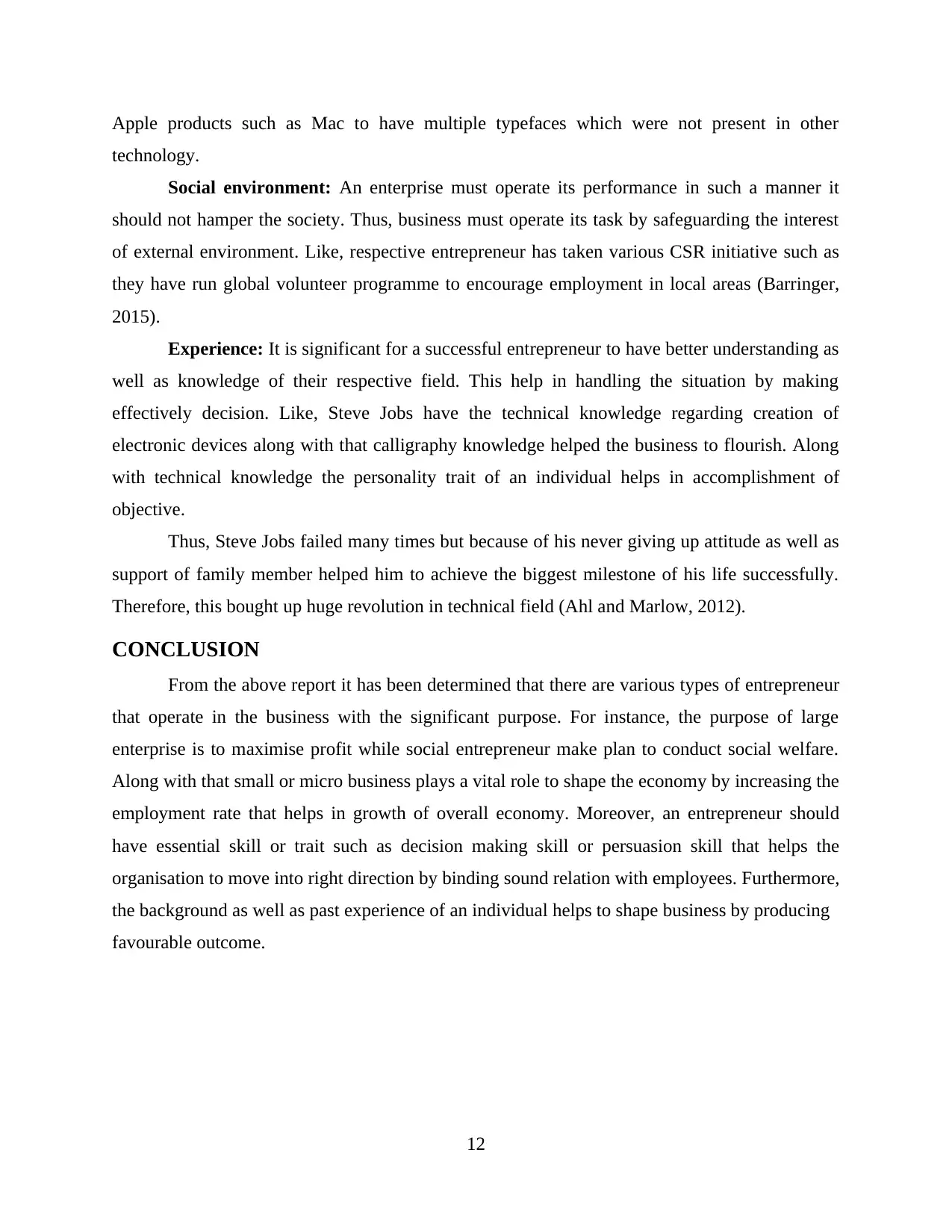
Apple products such as Mac to have multiple typefaces which were not present in other
technology.
Social environment: An enterprise must operate its performance in such a manner it
should not hamper the society. Thus, business must operate its task by safeguarding the interest
of external environment. Like, respective entrepreneur has taken various CSR initiative such as
they have run global volunteer programme to encourage employment in local areas (Barringer,
2015).
Experience: It is significant for a successful entrepreneur to have better understanding as
well as knowledge of their respective field. This help in handling the situation by making
effectively decision. Like, Steve Jobs have the technical knowledge regarding creation of
electronic devices along with that calligraphy knowledge helped the business to flourish. Along
with technical knowledge the personality trait of an individual helps in accomplishment of
objective.
Thus, Steve Jobs failed many times but because of his never giving up attitude as well as
support of family member helped him to achieve the biggest milestone of his life successfully.
Therefore, this bought up huge revolution in technical field (Ahl and Marlow, 2012).
CONCLUSION
From the above report it has been determined that there are various types of entrepreneur
that operate in the business with the significant purpose. For instance, the purpose of large
enterprise is to maximise profit while social entrepreneur make plan to conduct social welfare.
Along with that small or micro business plays a vital role to shape the economy by increasing the
employment rate that helps in growth of overall economy. Moreover, an entrepreneur should
have essential skill or trait such as decision making skill or persuasion skill that helps the
organisation to move into right direction by binding sound relation with employees. Furthermore,
the background as well as past experience of an individual helps to shape business by producing
favourable outcome.
12
technology.
Social environment: An enterprise must operate its performance in such a manner it
should not hamper the society. Thus, business must operate its task by safeguarding the interest
of external environment. Like, respective entrepreneur has taken various CSR initiative such as
they have run global volunteer programme to encourage employment in local areas (Barringer,
2015).
Experience: It is significant for a successful entrepreneur to have better understanding as
well as knowledge of their respective field. This help in handling the situation by making
effectively decision. Like, Steve Jobs have the technical knowledge regarding creation of
electronic devices along with that calligraphy knowledge helped the business to flourish. Along
with technical knowledge the personality trait of an individual helps in accomplishment of
objective.
Thus, Steve Jobs failed many times but because of his never giving up attitude as well as
support of family member helped him to achieve the biggest milestone of his life successfully.
Therefore, this bought up huge revolution in technical field (Ahl and Marlow, 2012).
CONCLUSION
From the above report it has been determined that there are various types of entrepreneur
that operate in the business with the significant purpose. For instance, the purpose of large
enterprise is to maximise profit while social entrepreneur make plan to conduct social welfare.
Along with that small or micro business plays a vital role to shape the economy by increasing the
employment rate that helps in growth of overall economy. Moreover, an entrepreneur should
have essential skill or trait such as decision making skill or persuasion skill that helps the
organisation to move into right direction by binding sound relation with employees. Furthermore,
the background as well as past experience of an individual helps to shape business by producing
favourable outcome.
12
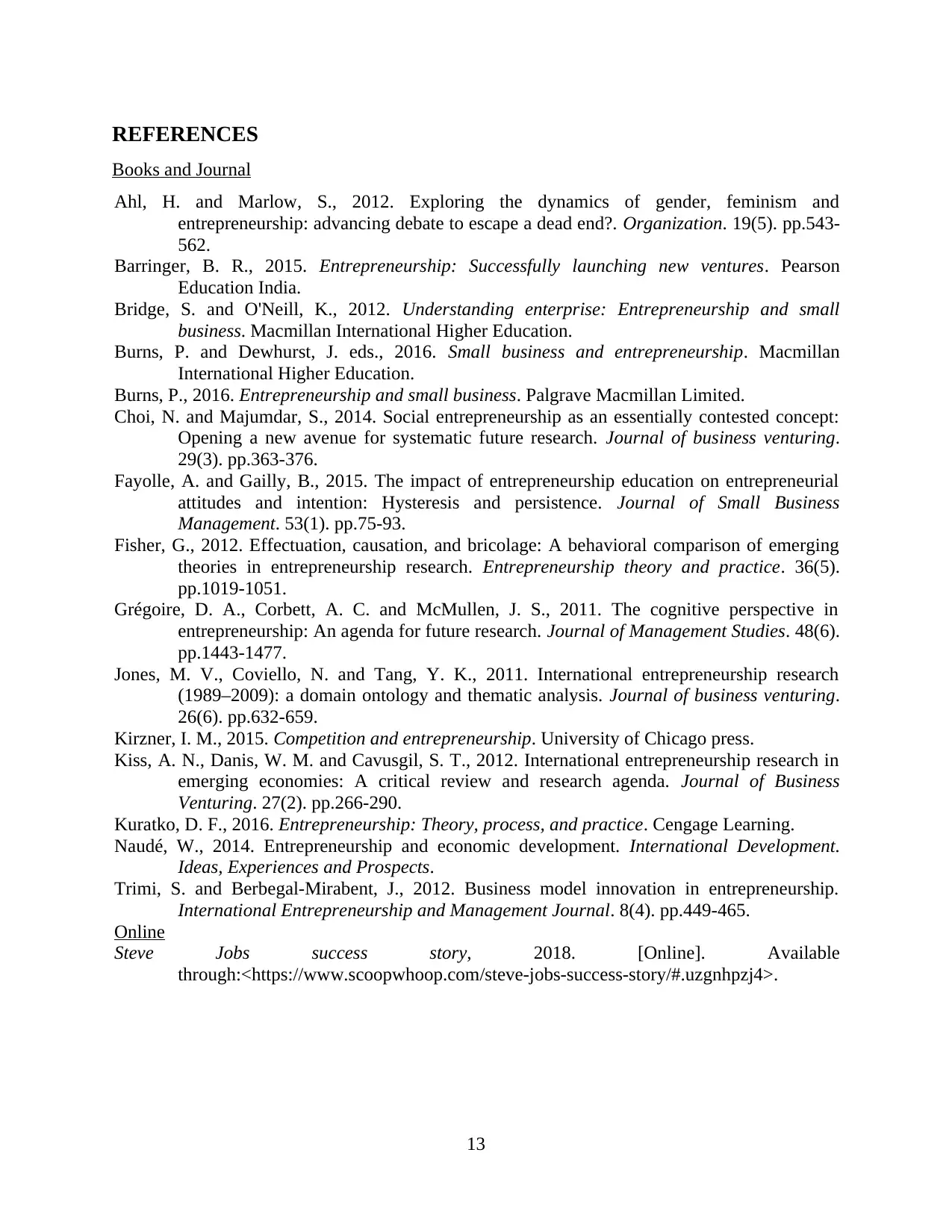
REFERENCES
Books and Journal
Ahl, H. and Marlow, S., 2012. Exploring the dynamics of gender, feminism and
entrepreneurship: advancing debate to escape a dead end?. Organization. 19(5). pp.543-
562.
Barringer, B. R., 2015. Entrepreneurship: Successfully launching new ventures. Pearson
Education India.
Bridge, S. and O'Neill, K., 2012. Understanding enterprise: Entrepreneurship and small
business. Macmillan International Higher Education.
Burns, P. and Dewhurst, J. eds., 2016. Small business and entrepreneurship. Macmillan
International Higher Education.
Burns, P., 2016. Entrepreneurship and small business. Palgrave Macmillan Limited.
Choi, N. and Majumdar, S., 2014. Social entrepreneurship as an essentially contested concept:
Opening a new avenue for systematic future research. Journal of business venturing.
29(3). pp.363-376.
Fayolle, A. and Gailly, B., 2015. The impact of entrepreneurship education on entrepreneurial
attitudes and intention: Hysteresis and persistence. Journal of Small Business
Management. 53(1). pp.75-93.
Fisher, G., 2012. Effectuation, causation, and bricolage: A behavioral comparison of emerging
theories in entrepreneurship research. Entrepreneurship theory and practice. 36(5).
pp.1019-1051.
Grégoire, D. A., Corbett, A. C. and McMullen, J. S., 2011. The cognitive perspective in
entrepreneurship: An agenda for future research. Journal of Management Studies. 48(6).
pp.1443-1477.
Jones, M. V., Coviello, N. and Tang, Y. K., 2011. International entrepreneurship research
(1989–2009): a domain ontology and thematic analysis. Journal of business venturing.
26(6). pp.632-659.
Kirzner, I. M., 2015. Competition and entrepreneurship. University of Chicago press.
Kiss, A. N., Danis, W. M. and Cavusgil, S. T., 2012. International entrepreneurship research in
emerging economies: A critical review and research agenda. Journal of Business
Venturing. 27(2). pp.266-290.
Kuratko, D. F., 2016. Entrepreneurship: Theory, process, and practice. Cengage Learning.
Naudé, W., 2014. Entrepreneurship and economic development. International Development.
Ideas, Experiences and Prospects.
Trimi, S. and Berbegal-Mirabent, J., 2012. Business model innovation in entrepreneurship.
International Entrepreneurship and Management Journal. 8(4). pp.449-465.
Online
Steve Jobs success story, 2018. [Online]. Available
through:<https://www.scoopwhoop.com/steve-jobs-success-story/#.uzgnhpzj4>.
13
Books and Journal
Ahl, H. and Marlow, S., 2012. Exploring the dynamics of gender, feminism and
entrepreneurship: advancing debate to escape a dead end?. Organization. 19(5). pp.543-
562.
Barringer, B. R., 2015. Entrepreneurship: Successfully launching new ventures. Pearson
Education India.
Bridge, S. and O'Neill, K., 2012. Understanding enterprise: Entrepreneurship and small
business. Macmillan International Higher Education.
Burns, P. and Dewhurst, J. eds., 2016. Small business and entrepreneurship. Macmillan
International Higher Education.
Burns, P., 2016. Entrepreneurship and small business. Palgrave Macmillan Limited.
Choi, N. and Majumdar, S., 2014. Social entrepreneurship as an essentially contested concept:
Opening a new avenue for systematic future research. Journal of business venturing.
29(3). pp.363-376.
Fayolle, A. and Gailly, B., 2015. The impact of entrepreneurship education on entrepreneurial
attitudes and intention: Hysteresis and persistence. Journal of Small Business
Management. 53(1). pp.75-93.
Fisher, G., 2012. Effectuation, causation, and bricolage: A behavioral comparison of emerging
theories in entrepreneurship research. Entrepreneurship theory and practice. 36(5).
pp.1019-1051.
Grégoire, D. A., Corbett, A. C. and McMullen, J. S., 2011. The cognitive perspective in
entrepreneurship: An agenda for future research. Journal of Management Studies. 48(6).
pp.1443-1477.
Jones, M. V., Coviello, N. and Tang, Y. K., 2011. International entrepreneurship research
(1989–2009): a domain ontology and thematic analysis. Journal of business venturing.
26(6). pp.632-659.
Kirzner, I. M., 2015. Competition and entrepreneurship. University of Chicago press.
Kiss, A. N., Danis, W. M. and Cavusgil, S. T., 2012. International entrepreneurship research in
emerging economies: A critical review and research agenda. Journal of Business
Venturing. 27(2). pp.266-290.
Kuratko, D. F., 2016. Entrepreneurship: Theory, process, and practice. Cengage Learning.
Naudé, W., 2014. Entrepreneurship and economic development. International Development.
Ideas, Experiences and Prospects.
Trimi, S. and Berbegal-Mirabent, J., 2012. Business model innovation in entrepreneurship.
International Entrepreneurship and Management Journal. 8(4). pp.449-465.
Online
Steve Jobs success story, 2018. [Online]. Available
through:<https://www.scoopwhoop.com/steve-jobs-success-story/#.uzgnhpzj4>.
13

Appendix
Illustration 1: Skills of Entrepreneur
14
Illustration 1: Skills of Entrepreneur
14
1 out of 16
Related Documents
Your All-in-One AI-Powered Toolkit for Academic Success.
+13062052269
info@desklib.com
Available 24*7 on WhatsApp / Email
![[object Object]](/_next/static/media/star-bottom.7253800d.svg)
Unlock your academic potential
© 2024 | Zucol Services PVT LTD | All rights reserved.





